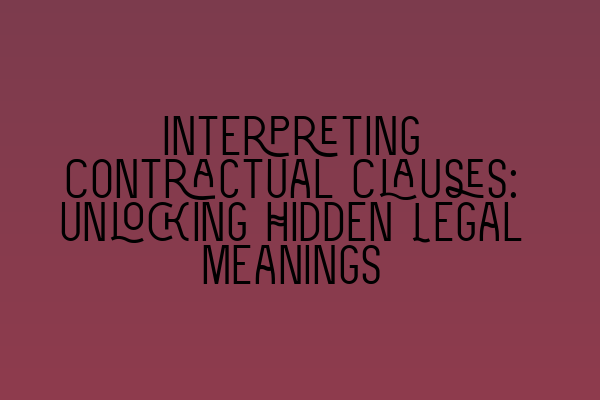Interpreting Contractual Clauses: Unlocking Hidden Legal Meanings
Contracts are the backbone of business transactions and legal agreements. They provide a framework for the parties involved to clearly define their rights, responsibilities, and obligations. However, the language used in contractual clauses can often be complex and open to interpretation. This is where the art of contract interpretation comes into play.
Interpreting contractual clauses requires a deep understanding of legal principles, case law, and the specific context in which the contract was drafted. It involves analyzing the language used, the intention of the parties, and the surrounding circumstances to determine the true meaning of the clause.
When it comes to interpreting contractual clauses, there are several key principles that solicitors and legal professionals follow:
1. The Literal Rule
The literal rule holds that the words used in a contract should be given their ordinary and natural meaning, unless to do so would lead to absurd or unworkable results. This means that the courts will interpret the words of the contract based on their plain and ordinary meaning.
However, there are exceptions to this rule. For example, if the literal interpretation would lead to a result that is clearly contrary to the intention of the parties, or if the words used are ambiguous, the courts may look beyond the literal meaning.
2. The Golden Rule
The golden rule allows for a departure from the literal meaning of the words when they are capable of more than one interpretation. In such cases, the courts will choose the interpretation that gives effect to the most reasonable and just outcome.
This rule is often used when the literal interpretation would lead to absurd or contradictory results. By using the golden rule, the courts can ensure that the true intention of the parties is upheld, even if it means departing from the literal meaning of the words.
3. The Mischief Rule
The mischief rule looks beyond the actual words used in a contract and focuses on the problem or “mischief” that the clause was intended to solve. By understanding the underlying problem or purpose, the courts can interpret the clause in a way that achieves the intended outcome.
This rule is particularly useful when the language used is vague or ambiguous. Instead of solely relying on the literal or golden rule, the courts can consider the wider context and purpose of the clause to determine its meaning.
4. The Ejusdem Generis Rule
The ejusdem generis rule is a rule of construction that applies when a general term is followed by specific examples. This rule provides that the general term should be interpreted to include only things of the same kind as the specific examples.
For example, if a contract states that “cars, trucks, and other vehicles are allowed on the premises,” the ejusdem generis rule would interpret “other vehicles” to mean only vehicles of the same kind as cars and trucks, such as motorcycles or vans.
5. The Contra Proferentem Rule
The contra proferentem rule is a rule of interpretation that applies when there is ambiguity or doubt about the meaning of a contractual clause. It states that any ambiguity should be resolved against the party who drafted the contract.
This rule is based on the principle that the party who drafts the contract is in the best position to clarify any ambiguous language. By placing the burden of clarification on the drafter, the courts can ensure that any uncertainty is resolved in favor of the other party.
Overall, interpreting contractual clauses requires a careful analysis of the language used, the intention of the parties, and the surrounding circumstances. By applying the key principles of interpretation, solicitors and legal professionals can unlock hidden legal meanings and ensure that contracts are understood and enforced according to their true intent.
If you’re preparing for the SQE exams and want to strengthen your knowledge of contract law and interpretation, check out these related articles:
- SQE 1 Practice Exam Questions
- SQE 1 Practice Mocks FLK1 FLK2
- SQE 2 Preparation Courses
- SQE 1 Preparation Courses
- SRA SQE Exam Dates
Good luck with your contract law studies!
